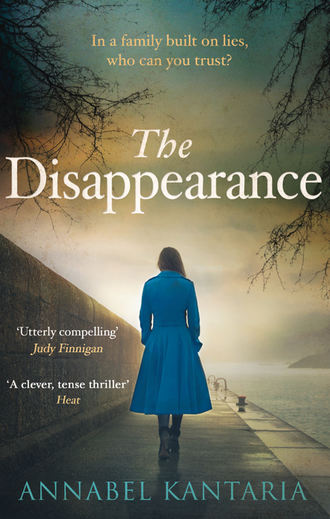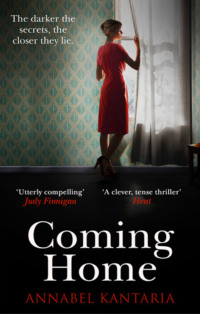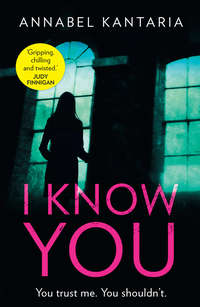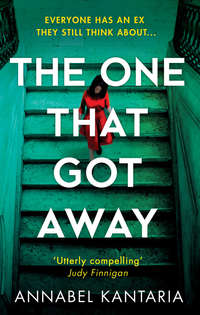
Полная версия
The Disappearance
I put my head in my hands. John was the worrier of the two of us. He saw danger in everything, always envisaged the worst possible outcome, and the fact that Valya had fallen down the stairs clearly hadn’t helped. I knew all this about John, but it didn’t make dealing with him any easier.
‘I don’t know what to say,’ I said. ‘I think you’re over-thinking things.’
‘I’m not. You know, the night after the car accident, she called me Mack.’
‘Mack? Do we even know a Mack?’
‘Exactly. She looked right at me – almost through me – when she was lying in that hospital bed, and she called me Mack. She looked like she was about to cry.’
‘Strange. Did you correct her?’
‘Yes.’
‘And?’
‘She shook her head and said “Of course. Silly me.”’ John did quite a good impression.
I traced the wood grain on the table. ‘I don’t think you can read anything into that. Really. Not given she’d just had the accident.’
‘Anyway, look, let’s not get sidetracked,’ said John. ‘We’re here to think of solutions, not drag over the past.’
‘So, what solutions do you have in mind?’
John picked at the skin around one of his nails. ‘Well. As I said the other day: perhaps some sort of sheltered housing would be the way to go.’ I recoiled as an image of frail old ladies on Zimmer frames filled my mind: Mum would shrivel up and die. But, equally, I didn’t have space for her at home. ‘You know,’ John continued, ‘something safer, where she’s got people to keep an eye on her twenty-four seven.’
I turned away, shaking my head.
‘Come on, Lexi. Admit it. You don’t want to be constantly running after her any more than I do. We both have busy lives. Work. Family. I know you’ve moved down here to be closer but seeing her once a month is about all either of us can manage – right?’ He looked at me and I pursed my lips. ‘You don’t want to be worrying about her all the time, jumping each time the phone rings, spending nights dashing down to the hospital, do you?’
I said nothing.
‘Let’s be honest: neither of us has time to babysit her every day.’
‘We’re not at that stage yet.’
‘But when it happens,’ John spoke through clenched teeth.
‘But it’s not happened yet.’ I echoed his tone.
‘I want to be prepared.’
‘I hear you. I do,’ I said, trying to be reasonable. ‘But sheltered housing? She’ll never go for it.’
‘There are some nice places out there. I looked.’
‘But she’s still entirely self-sufficient. And happy. She loves that garden.’
John laughed: a snort that sprayed cider onto the table. ‘Happy’s not a problem, Lex. She’s happy as bloody Larry. She’s go no idea. Floats about in a dream world.’ John shook his head and laughed.
‘Come, now. That’s a bit harsh.’
‘Really? Look at what almost happened with the painting.’
I tutted. Mum had a painting – a small piece that had always hung in the loo in Barnes. ‘If anything happens to your father and me, and you need money,’ she’d told John and I while we were growing up, ‘that painting’s worth as much as the house.’ I’d found it hard to believe: although the scene of country flowers was pretty, I saw nothing special in it: the lines were blurry and the colours muted – it wasn’t to my taste at all.
Still, a few months ago, John had arrived for lunch to find Mum had almost handed over the painting to a conman. John knew at once it was a scam that’d been going on in the area: the gang targeted the elderly. Under the pretence of cleaning artwork, jewellery, and antiques, they would take the originals and swap them for copies. Most of the victims never noticed the difference. Although Mum had denied she’d ever been going to get the painting cleaned, John had thought differently.
‘You don’t know she was going to hand it over,’ I said now.
‘Why else would she have had it out?’ he asked. ‘She was so evasive about the whole thing. Thank God I turned up when I did. She wouldn’t tell me why that man had been there, nor why the painting was out. When I told her about the scam, she had to sit down with a sherry.’ John shook his head as he recalled the day. ‘We nearly lost our inheritance that day, Lexi.’
‘You’ve no idea if that’s our inheritance or not.’
‘Oh, come on, Lexi! What else is she going to do with it?’
‘Pa didn’t leave anything to us. Remember he wanted us to “make our own way in the world”? Maybe she’ll do the same?’
‘I know, I know. “I’m a self-made man and proud of it.”’ John’s impression of our father was also eerily good; for a moment he was right back in the pub with us. ‘Anyway, this is Mum. Of course she’ll leave us something, and the painting’s worth a fortune.’
I shook my head. ‘That’s all by the by. The point is, we can’t push her out of her home just because she might – or might not – have believed a con artist.’ I paused. ‘She’d hate it. She’d curl up and die.’ I snorted. ‘Maybe Valya dived headfirst down the stairs rather than go into a home.’
‘Valya didn’t know what her name was, let alone what was about to happen to her. She had the memory of a goldfish by the time she died.’
I tutted. ‘Anyway,’ I leaned forward over my coffee cup, cupping it with my hands. ‘Back to Mum. So you want a plan “moving forward” and you’re thinking sheltered housing?’
John leaned back. ‘Yes. Exactly. Somewhere where there are people – professionals – there to keep an unobtrusive eye on her. Where she’s got a built-in support network to act in an emergency. Maybe she’ll even make some friends.’
‘Hmph.’ I was trying to imagine explaining all that to Mum.
‘If we go for something where she can sell her current house and invest the money in a flat of some sort, it can continue to be an investment. Rather than, say, something like a retirement home where you’re paying people to look after her and there’s no investment.’
I closed my eyes. My brother: always looking at the financial bottom line.
John buried his face in his hands. When he looked up again, he looked utterly defeated. ‘Well, can you come up with a better idea?’ he said. ‘I can’t think of any other solution. I mean, God, Lexi. Work is shit at the moment. I mean, really shit.’ His voice caught. ‘The twins just seem to need money all the time. Money and lifts and clothes and gym classes and riding lessons and music classes and school trips. It’s one thing after another. I’m hard up against it and worrying about Mum is just one thing I don’t need.’
I rubbed my jaw. As far as I knew, John was doing really well. He must be ploughing all his money back into the business. But, if cash flow was an issue, why didn’t Anastasia get a job? Even something part-time while the twins were at school?
‘All right, all right,’ I said. ‘But isn’t this something that should come from Mum herself? She needs to believe she needs to move, otherwise it’ll be a disaster. We can’t force her.’
‘That’s where we come in. We need to plant the idea in her head. Water it.’
I laughed. ‘Good luck with that!’
John narrowed his eyes and exhaled. ‘We could always try to expedite things.’ His voice was low and I wasn’t sure I’d heard correctly.
‘Expedite?’
He cocked his head. ‘You know … speed things up a little.’
I shook my head.
‘Do small things to make her start doubting herself.’
‘What?’ I stared at my brother.
John shifted awkwardly on his seat. ‘You know … there are ways. It wouldn’t be too difficult.’
‘John! That’s evil! Pure evil. How could you even think of such a thing?’
He closed his eyes. He had the grace to look sheepish, I’ll give him that. ‘But if we don’t,’ he said, ‘how are we going to get her to agree to move?’
‘How about we talk to her? Express our concerns. Good grief, John, she’s our mother, not the enemy!’
John drained his pint. ‘Anyway, think about it. I’m going to do some research, check out some places.’
I closed my eyes.
‘I’ll send you some info,’ he said. ‘Maybe we can see a few places together.’ I didn’t say anything. ‘Look, I know what you’re thinking,’ John continued. ‘But they have nice retirement villages these days.’
‘Whatever,’ I said. I pushed back my chair and stood up. ‘Do what you want. I’m going to go and see Mum. I know it’s not your turn, but why don’t you come too?’
‘Sure,’ John sighed. ‘As long as the end’s in sight.’
15 July 1973
Barnes, London
Audrey walks to the front door, turns around, then walks through the entrance hall of the Barnes house and into the drawing room, trying to imagine how it will look to the dinner guests seeing her home for the first time. For London, the four-storey semi is generously sized. It’s also been beautifully decorated and fitted out but, for Audrey, there’s a hollowness at its heart: something is missing.
She pauses on the threshold of the ground floor drawing room, enjoying the way the light from the well-placed lamps pools in the room. She likes the elegant furniture that the interior designer has chosen; she likes the soft colours of the décor. Her eyes roam the room and everything she sees is pleasing to her but still something isn’t right. Audrey breathes in the scent of the house and, in that moment, in that deep inhalation, she realises what it is that’s absent from her impressive London home: India. The damp-earth smell of India; the faint stench of the city, stronger near the slums, but noticeable even in the area where she and Ralph had lived. Even though it’s mid-summer, London’s been grey and overcast all week, the sun steadily losing its game of hide and seek with the clouds. Outside the house, the most dominant smell on the busy street is that of exhaust fumes. Audrey has the sense that she’s living on tarmac and concrete; that she’s disconnected from nature. She misses the dirt, the earth, the mud and the rawness of Bombay. As she stands in her beautiful home, a sob rises in Audrey’s chest; even after being in England for a year, her longing for India is still visceral.
Audrey gives herself a little shake and walks over to the gilded mirror that hangs above the fireplace. ‘You’re very lucky,’ she tells her reflection. ‘You have what so many women dream of: a beautiful home. Two children. A husband who loves you …’ She pauses, rallies herself. ‘You’re turning thirty,’ she says firmly, ‘and you’re very lucky.’
The priceless piece of artwork which she bought with the inheritance from her parents hangs in the downstairs cloakroom, its colours judged by the interior designer to be discordant with their home’s colour scheme. It tickles Audrey just a little that the most valuable item in the house hangs in the loo; that neither Ralph nor the disapproving designer have a clue.
Конец ознакомительного фрагмента.
Текст предоставлен ООО «ЛитРес».
Прочитайте эту книгу целиком, купив полную легальную версию на ЛитРес.
Безопасно оплатить книгу можно банковской картой Visa, MasterCard, Maestro, со счета мобильного телефона, с платежного терминала, в салоне МТС или Связной, через PayPal, WebMoney, Яндекс.Деньги, QIWI Кошелек, бонусными картами или другим удобным Вам способом.





